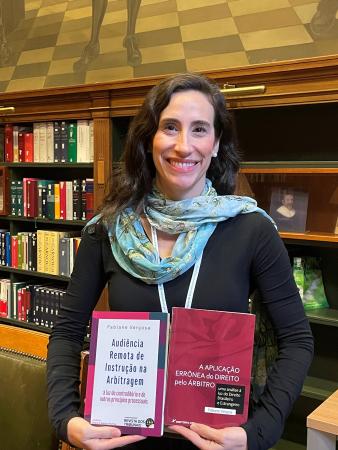Earlier this year, the Library received two book donations from professor and author Fabiane Verçosa from Brazil. These are: ‘The Erroneous Application of Law by the Arbitrator’ and ‘Remote Evidentiary Hearing in Arbitration’.
A Aplicação Errônea do Direito pelo Árbitro. Uma Análise à Luz do Direito Brasileiro e Estrangeiro, Curitiba, CRV, 2015.
[The Erroneous Application of Law by the Arbitrator. An Analysis vis-à-vis Brazilian and Foreign Law]
This book examines the erroneous application by the arbitrator of Brazilian Law with regards to the merits of the dispute. In principle, such circumstance would be considered an arbitrator’s error in judicando and no legal remedy would be admitted in this scenario, since révision au fond is generally not accepted in what concerns arbitral awards. However, situations such as these are much more complex than they appear and results may vary from one country to the other.
Due to the originality in Brazil, of the study of the consequences that may arise to the arbitral award in which took place an erroneous application of Substantive Law, the analysis of Comparative Law was fundamental. Therefore, this book analyses the laws of the United States of America, the United Kingdom, Germany, Italy, Austria, Switzerland and France.
First, we examined the consequences that can arise to a domestic arbitral award – as defined in the legislation of each country at hand – in the seven countries examined. Since the habitual measure to set aside a domestic arbitral award consists in its annulment by state courts, the author analyses the grounds to set aside such award in each of these seven countries, so that we could find out whether the erroneous application of the governing law is included therein. Not only legal rules, but also local doctrine and case-law of the seven selected countries played a very important role in this analysis.
Second, the author further examines the consequences that may arise to a foreign arbitral award in which the governing law was wrongly applied. Once all seven selected countries are members of the 1958 New York Convention on the Recognition and Enforcement of Foreign Arbitral Awards (hereinafter “New York Convention”, which stipulates in Article 5, no. 2, b, that the violation of public policy is an obstacle for recognition and enforcement of the foreign arbitral award), the application of the New York Convention in each of the seven countries was examined. The author tried to find out whether the violation of public policy set forth in the New York Convention could encompass the erroneous application by the arbitrator of material law.
The last chapter finally examines Brazilian Law – not only in what relates to the action to set aside Brazilian domestic arbitral awards, but also the recognition and enforcement of foreign awards in Brazil – in order to suggest solutions to this question in the Brazilian legal system.
The book is a shorter version of the S.J.D. Thesis of the author in International Law at the State University of Rio de Janeiro, Brazil (UERJ).
Audiência Remota de Instrução na Arbitragem à luz do Contraditório e de Outros Princípios Processuais, São Paulo, Revista dos Tribunais, 2022.
[Remote Evidentiary Hearing in Arbitration. An Analysis vis-à-vis the Right to be Heard and Other Procedural Principles]
On March 11, 2020 the World Health Organization announced that the world was facing the COVID-19 Pandemic. As a consequence, lock down began in many countries. Suddenly, people could not leave their homes, except on very specific grounds. Millions of people died all over the world due to the new coronavirus.
This scenario would obviously impact arbitral proceedings, either domestic or international. One of the most serious consequences that arose to arbitration is that evidentiary hearings could not take place physically for a while, with all participants at the same place, since it would violate sanitary regulations from most countries. The risk of becoming infected with COVID-19 was also too high. Therefore, remote evidentiary hearings began to take place in arbitrations much more often than ever before. Remote evidentiary hearings were then considered the only way for the arbitral proceeding to continue its route. Otherwise, arbitrations would have to be delayed for a long and unpredictable time.
Although remote hearings were regarded as an useful tool, it was subject to a lot of criticism. Many argued that the videoconference format would violate parties’ right to be heard and due process, as well as other procedural principles. As one may note, this is not a frivolous discussion, since the evidentiary hearing is one of the most important stages of and arbitral proceeding. It may take days (or even weeks!) and it is usually paramount for decision making by arbitrators.
This book examines the evolution of the right to be heard and due process in Legal History. Further, it examines such principles not only in arbitration, but also in civil (judicial) procedure, especially in Brazil. The book further examines the legal nature of arbitration itself (contractual? jurisctional? etc.) and the application of procedural principles to arbitration. Finally, the book tries to answer the following question: does a remote evidentiary hearing itself violate parties’ right to be heard and due process in arbitration? For that, the author analyses Brazilian and foreign legal rules and doctrine, arbitration rules from many arbitral institutions, as well as case-law.
About the Author
Fabiane Verçosa holds a Bachelor of Law degree, a Masters and a SJ.D. in International Law from the State University of Rio de Janeiro (UERJ), Brazil. In 2017, she was a Visiting Scholar at the Postdoctoral level at the Max-Planck-Institut in Hamburg. She is a Professor at FGV Rio de Janeiro Law School, where she teaches Arbitration and Private International Law. She is currently the Editor-in Chief of the Brazilian Arbitration Journal. In addition to her professorship, Fabiane is a Partner of the Law Firm Verçosa Advocacia , in Rio de Janeiro, Brazil.
